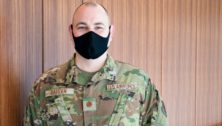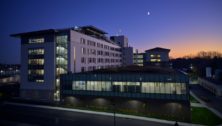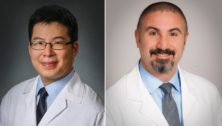Meet Chester County Hospital’s New Spine Surgeon: Q&A with Dr. Sherif Sherif
Cairo, Egypt.
Santa Monica, Calif.
Boston, Mass.
Rochester, N.Y.
Cherry Hill, N.J.
West Chester, Pa.
No, this isn’t a list of destinations to add to your future vacations — though it would be an exciting list if it were. This is just a handful of the many places Dr. Sherif Sherif has called home.
Along with his wife, and later, their two daughters, and even later, their three cats, Dr. Sherif has traveled from coast to coast and across the ocean, exploring the world and studying medicine.
Dr. Sherif, specializes in Orthopaedic Spine Surgery, including degenerative spine disease, minimally invasive spine surgery, adult spine deformity, spine trauma, and spine infections and tumors. He joined the Chester County Hospital community this January.
Dr. Sherif brings medical experience from around the globe to Chester County. He received his Medical Degree from Tanta University in Tanta, Egypt, and completed his Orthopaedic residency at Cairo University in Cairo, Egypt. After moving to the U.S. with his wife, a Texas native, he conducted five years of research in orthopedics in southern California — two years at the Hip & Pelvis Institute at St. John’s Health Center in Santa Monica and three years at the L.A. Orthopaedic Institute at St. Vincent Medical Center in downtown Los Angeles. Later, he completed four orthopedic fellowships with three of them in spine surgery — each focused on different parts of the spine — at Massachusetts General Hospital, Newton-Wellesley Hospital, the University of Rochester, and finally, at the University of Pennsylvania.
In short, Dr. Sherif is no stranger to new communities — or to the human spine. Here, he answers some questions about his medical career, his values, and what makes him excited about becoming a part of the Chester County community.
Let’s start at the beginning. Why did you decide to enter the medical field?
Dr. Sherif: My father is a general surgeon, my mother and older brother are pathologists, my uncle is an OB/GYN, my other uncle is a plastic surgeon, my mother-in-law is a pathologist, there is another uncle that is a general surgeon — I was born into this field. All of my life, people grew up to be doctors.
Back home when I was a kid, we had a big hospital right next to where we lived. I remember that one night, I saw one of my dad’s friends leaving the hospital. At that time, things were super safe, so we were playing out on the streets until around 2 AM. Literally, at 2 AM, this guy was leaving the hospital looking so tired — his shirt was untucked, he looked miserable. He had just finished surgery and got in his car. It’s really crazy, but I thought, knowing that he most likely had just saved someone’s life or made it much better, “That’s what I want to do with my life.”
I never thought about anything else. It was a no-brainer to be a doctor.
What drew you to orthopedic surgery specifically?
Dr. Sherif: I wanted to be a plastic surgeon first. My uncle was a plastic surgeon, and I was very fascinated by plastic surgery in the movies. In my internship, I did two months of plastic surgery — one month in the burn unit and one month in plastic surgery. I didn’t like either, and I floated around for a couple of years in general surgery, pediatric surgery, neurosurgery — everything.
One day, I was moonlighting at a small hospital in Cairo, and we had a patient with a condition that every doctor examined. He had leg pain, sciatica (pain in the sciatic nerve starting in the lower back and down to the legs and feet), and drop foot (difficulty lifting the front part of the foot, causing trouble walking), and he was becoming paralyzed. The neurosurgeon came and saw him, then the neurologist came and saw him. They diagnosed him with a disc herniation (when a part of one of the discs that sits between the bones of the spine is pushed out causing nerve compression) and dismissed the case.
Then, the orthopaedic surgeon came, who thought the patient’s exam did not match the diagnosis he was given. He asked for an updated MRI and a CT scan, and the patient turned out to have cancer in his pelvic bone. The orthopedic surgeon was the only one that diagnosed, operated on, and saved the patient. I thought, “Okay, these people really know what they’re doing. I’m going to be an orthopedic surgeon.”
I actually stuck with that doctor. He was my mentor for the next 10 years, and he has shaped my whole career. Orthopedic surgery is life-changing. I love it.
What is the most challenging part of your job?
Dr. Sherif: Spine surgery. There is nothing in spine surgery that is a simple, small, or easy case. Every single day, and every single patient that I see — it is a big challenge.
A patient comes in with what we think is a small case, like an obvious disc herniation. And for us, it’s an “easy” case. I’m going to go in, pluck that disc out, and everything is going to be okay. But you can go into the simplest case and end up in surgery for three hours meticulously dissecting a disc fragment that is stuck and adhering to the dural sac that surrounds the nerves.
That’s the most challenging part about the spine. You are working right next to the spinal cord and the nerve that makes us move. You have to be 100 percent focused all the time, working at 100 percent or even 120 percent capacity. The difficult and hard cases, and what people call challenging about the spine — that’s what I like.
And the most rewarding part of your job?
Dr. Sherif: Let’s reference the same case — someone comes in with what we call a “simple” case of disc herniation with their life literally ruined. They can’t walk, they can’t move, they can’t play sports, they can’t pick up their child, they can’t do anything. We do the surgery, and the next morning, I see the patient, and they say, “I’m a new human. My leg doesn’t hurt — all the pain is gone, and I can move again!” That makes my day.
Just to see the smile on my patients’ faces — that’s what makes me wake up the next morning, to go make rounds and see the patients I had yesterday. If you do spine surgery for the right reasons, it works like magic.
What is the most important thing you’ve learned in your career so far?
Dr. Sherif: Be good to your patients. Treat your patients exactly like they are your family. This might sound like a cliché — but it is the absolute truth. Every patient who walks through the door is my mom, or my dad, or my brother, or my sister, or my wife, or my daughter. Period. I will never make a decision for a patient that I would not make for myself or my family.
A quote that embodies my values both in my work and everywhere is, “Treat everyone how you’d like to be treated yourself.” That’s what I tell my daughter, who is five years old, every day. “How do we treat people?” She answers, “The same way we would like to be treated.” That goes with me everywhere I go.
What excites you the most about joining the Chester County Hospital community?
Dr. Sherif: I’ve had the best mentors and the best training of all my four fellowships at Penn Medicine. At Penn, I’ve learned more than what I learned at the other three fellowships combined.
My only problem was that Pennsylvania Hospital and Penn Presbyterian Medical Center are in the city, within the heart of Philadelphia, and we are not big city people. We always have liked to live on the outskirts of cities.
I wanted to go out of the city to Chester County. West Chester is so beautiful, nature-wise. Before we had children, my wife and I were really into the outdoors. When we lived in Southern California, we picked up rock climbing pretty hard. We were rock climbing everywhere. When we had children, this stopped for a while. Now, we’re starting to take our five-year-old to the rock-climbing gym. It’s one of the things we love very much.
Chester County Hospital is my favorite-size hospital — a big, community-based hospital. You can do any surgery you want; however, it still feels like home. People say hi, and they actually know each other in the hallways. If they don’t know each other, they still say hi!
Chester County is a family place. It’s home. That’s what I love about it.
And the new operating suite at Chester County Hospital? It is hands-down the best I’ve ever seen in my life. There’s nothing like it. It looks like someone looked at all the mistakes in the operating room suites everywhere, and just fixed it. It’s a beautiful masterpiece. I will do my best to put it to the best use in my practice.
Everyone at Chester County has been working very hard to welcome me, and I will not let them down. And for my patients, I will treat you all like my family — with love and respect.
If you have questions about what an orthopedic spine surgeon can do for your neck or back pain, call 610-431-5000 or request an appointment online at the Spine Program at Chester County Hospital.
Tonight, from 6-7 PM, Dr. Sherif Sherif will host an online discussion about the latest surgical and non-surgical treatments for spine issues that cause back pain. Along with Dr. Justin Roh, a pain medicine specialist, he will explore treatments that include medications, injections, small incision joint replacement, and other state-of-the-art advancements.
_________
Connect With Your Community
Subscribe to stay informed!
"*" indicates required fields














![95000-1023_ACJ_BannerAd[1]](https://vista.today/wp-content/uploads/2023/03/95000-1023_ACJ_BannerAd1.jpg)

































